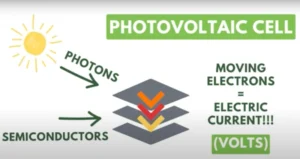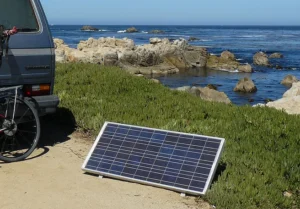Solar Panels 101: Energize Your Life with the Sun
In this article, we will explain how these amazing devices work and how they can make a difference to your home and the environment. Solar panels, also known as photovoltaic modules harness sunlight to produce clean electricity. But how do they do it?

Discovering photovoltaic cells
Solar panels are made up of photovoltaic cells, mainly made of silicon. These little wonders capture sunlight and turn it into electricity. How? When photons of sunlight strike these cells, they set electrons in the semiconductor material inside the cells in motion. This movement creates an electric current, thus turning solar energy into electricity.
From photovoltaic cells to solar panels
A group of these photovoltaic cells is assembled into a solar module, and multiple modules are combined to create a solar panel. Solar energy can be collected in large solar arrays, on the roofs of houses or other well-sunlit locations, typically facing south in the Northern Hemisphere.
And even beyond that there are large areas set aside for electricity production called solar farms.
Different variations of solar panels
There are different types of solar panels, each with its own characteristics and applications:
Polycrystalline Silicon Panels: These are the most common, inexpensive and have a good energy yield.
Monocrystalline Silicon Panels: They offer higher energy efficiency, but are more expensive and suitable for limited spaces. (We also have an article specially made to explain the differences between monocrystalline and polycrystalline panels.)
Thin Film Panels: Flexible and suitable for situations where traditional panels are not ideal.
Organic Photovoltaic Panels: They use organic materials but have lower energy efficiency.
Concentrated Panels: They use lenses or mirrors to concentrate sunlight onto small cells with high efficiency.
Bifacial Panels: They capture light from both the front and the back.
In addition to these, there are also portable solar panels, which are useful in many situations such as traveling, camping, or simply as an addition for home electrical systems.
Your choice of panel type will depend on your specific needs and environmental conditions.
Benefits of solar energy
Needless to say, solar energy is environmentally friendly and sustainable, helping to reduce environmental impact and combat climate change. It also helps you save money on your electricity bill. You can even sell excess energy to the power grid, earning a credit on your bill. In many countries, there are incentives for those who install solar systems. Below you can see the video we posted on our channel.
For more details and resources, subscribe to our YouTube channel to learn more about renewable energy and more sustainable lifestyles.

